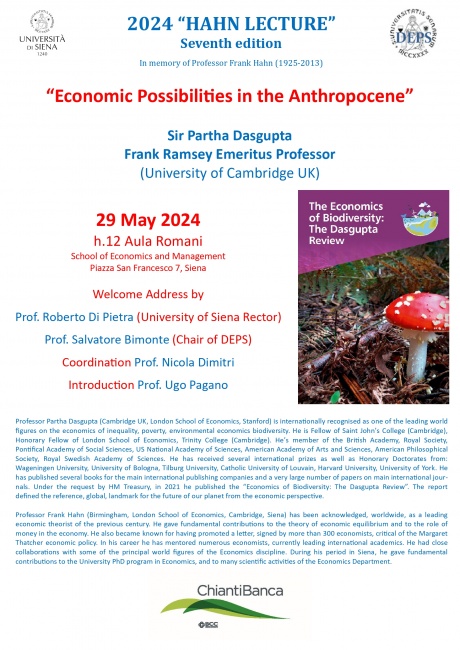Mercoledì, 29 Maggio, 2024 - 12:00
“Economic Possibilities in the Anthropocene”
- 29 maggio ore 12.00
l'Aula Romani del Plesso di San Francesco - Siena
Il giorno 29 Maggio dalle ore 12, presso l'Aula Romani del Plesso di San Francesco si terrà 7° Hahn Lecture dal titolo “Economic Possibilities in the Anthropocene”
E’ previsto l’intervento di Sir Partha Dasgupta, Frank Ramsey Emeritus Professor (University of Cambridge UK)
Welcome Address by
Prof. Roberto Di Pietra (University of Siena Rector)
Prof. Salvatore Bimonte (Chair of DEPS)
Coordination Prof. Nicola Dimitri
Introduction Prof. Ugo Pagano
- Professor Partha Dasgupta (Cambridge UK, London School of Economics, Stanford) is internationally recognised as one of the leading world figures on the economics of inequality, poverty, environmental economics biodiversity. He is Fellow of Saint John’s College, Honorary Fellow of London School of Economics, Trinity College (Cambridge). He’s member of the British Academy, Royal Society, Pontifical Academy of Social Sciences, US National Academy of Sciences, American Academy of Arts and Sciences, American Philosophical Society, Royal Swedish Academy of Sciences. He has received several international prizes as well as Honorary Doctorates from: Wageningen University, University of Bologna, Tilburg University, Catholic University of Louvain, Harvard University, University of York. He has published several books for the main international publishing companies and a very large number of papers on main international journals. Under the request by HM Treasury, in 2021 he published the “Economics of Biodiversity: The Dasgupta Review”. The report defined the reference, global, landmark for the future of our planet from the economic perspective.
- Professor Frank Hahn (Birmingham, London School of Economics, Cambridge, Siena) has been acknowledged, worldwide, as a leading economic theorist of the previous century. He gave fundamental contributions to the theory of economic equilibrium and to the role of money in the economy. He also became known for having promoted a letter, signed by more than 300 economists, critical of the Margaret Thatcher economic policy. In his career he has mentored numerous economists, currently leading international academics. He had close collaborations with some of the principal world figures of the Economics discipline. During his period in Siena, he gave fundamental contributions to the University PhD program in Economics, and to many scientific activities of the Economics Department.
 Ateneo
Ateneo Didattica
Didattica Ricerca
Ricerca Internazionale
Internazionale